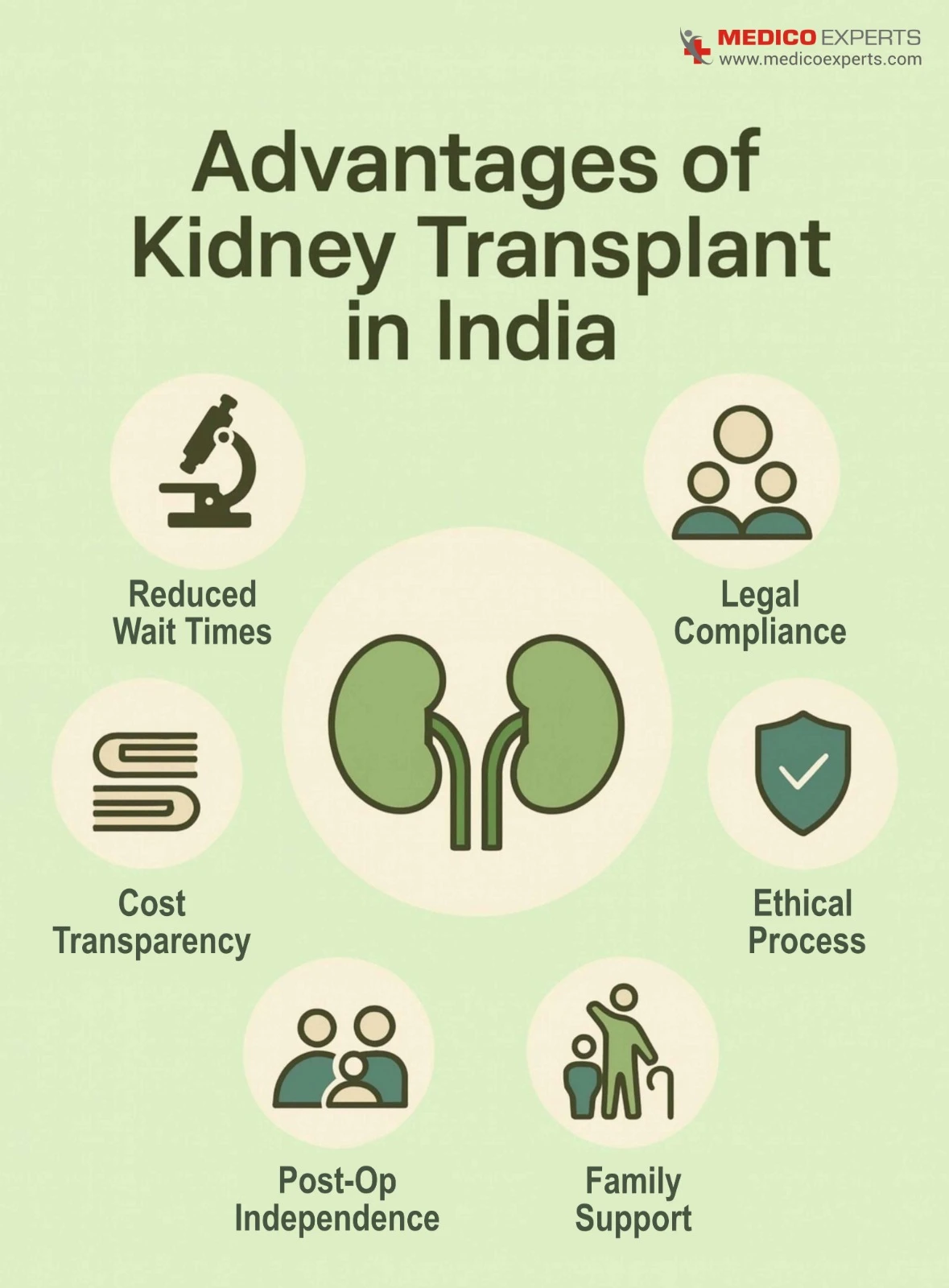Life-Saving Kidney Transplant in India in Just 12-18 Months!
With MedicoExperts' trusted end-to-end support for kidney transplant in India, families have seen faster transplant approvals, reduced costs, and successful recoveries.
Dialysis Dependence, Financial Drain & Fear

Watching a loved one’s daily struggles leaves you exhausted and worried for their survival.

Endless Dialysis Sessions
Three times a week, watching your loved one’s energy drain away.

Financial Burden
₹1.2 crore lifetime dialysis costs bankrupting families.

Uncertain Waitlists
5-8 year government hospital queues with no guarantees.

Hospital Hunting
Not knowing which centers are truly trustworthy and ethical.

Fear for the Future
“Will we find a donor in time, or will we lose them?”
If left unaddressed, these struggles can lead to organ failure, financial ruin, and preventable loss of life. But there are proven ways to help your loved one get the transplant they need safely and affordably.
MedicoExperts' Personalized Support for Kidney Transplant in India

Every transplant case is different. That’s why we don’t believe in “one-size-fits-all” solutions. Instead, we combine legal expertise with medical guidance and financial support that covers registration, surgery, and recovery. We use proven strategies for faster matching and long-term success.
1. Reduced Wait Times
2. Legal Compliance
3. Cost Transparency
4. Ethical Process
5. Post-Op Independence
6. Family Support

Medicoexperts’ Personalized Care Model for Kidney Transplant in India

Kidney failure doesn’t just affect the patient; it emotionally and financially devastates entire families. So we ensure you can focus entirely on what matters most: your loved one’s healing journey. We handle everything else, from complex legal paperwork and hospital coordination to travel arrangements and accommodation. This comprehensive approach ensures 100% ethical matching, dramatically reduces wait times from years to months, and provides lifelong post-transplant support so your family never feels alone.

Tailored Treatment Plans
No copy-paste approaches—your loved one’s needs come first
Every patient is unique, so we start by understanding their specific medical condition, financial situation, and donor options. Expect a personalized plan with clear steps, regular progress updates, and timely adjustments for the best outcomes.

Focus on Real, Visible Results
Track small wins that add up to life-changing outcomes
We know you want real progress and not just promises. So, we set clear monthly progress markers and keep you informed every step of the way.

Safe, Ethical Procedures
No shortcuts! No illegal practices! No compromised safety!
We know families are vulnerable during this crisis. That’s why all our processes follow strict NOTTO guidelines, and we work only with NABH-certified hospitals for complete peace of mind.

Cost-Effective Solutions
Quality care that respects your family’s financial limits
Many families spend heavily or travel abroad for scattered treatments, but we make transplants affordable by providing comprehensive, India-based care under one roof with transparent pricing.
Benefits of our Approach for Kidney Transplant in India

End-to-End Transplant Coordination
100% Legal Compliance Process
Personalized Medical Care
Focus on Family Support & Recovery
Visible Results in 12–18 Months
Who is This For?


Families Seeking Permanent Solution:
✓ Watching their loved one struggle with dialysis dependency
✓ Hoping for a successful, ethical transplant process
✓ Longing to see their family member healthy again

Families Facing Financial Challenges:
✓ Struggling with mounting dialysis and medical costs
✓ Avoiding treatment decisions due to financial constraints
✓ Hoping for transparent, affordable transplant options

Families Planning For Long-Term Care:
✓ Wanting their loved one to achieve post-transplant independence
✓ Looking for comprehensive solutions beyond just surgery
✓ Ready to explore proven pathways that bring visible results
Why Choose MedicoExperts for Kidney Transplant in India?

MedicoExperts is a global virtual hospital that brings together world-renowned transplant surgeons, evidence-based protocols, and compassionate care approaches under one trusted roof.
With a presence in over 17 countries and partnerships with top-tier NABH hospitals and specialists across India, we’ve helped more than 800 families access life-saving transplants at the right time and at the right cost.
Our unique strength lies in combining medical excellence with legal compliance and emotional support. We offer families not just a treatment plan but a personalized path to transplant success. Whether it’s live donor coordination, cadaver transplant registration, or postoperative care, MedicoExperts stands for ethics, empathy, and excellence.

Frequently Asked Questions (FAQs):

Q1. How safe and legal is the process of kidney transplant in India?
All our transplant processes are 100% NOTTO-compliant and conducted at NABH-certified hospitals under expert medical supervision with full legal documentation.
Q2. Is kidney transplant a permanent solution?
While kidney transplants aren’t permanent cures, successful transplants typically last 15-20 years (living donor) or 10-15 years (deceased donor), providing decades of normal life compared to lifelong dialysis dependency.
Q3. How soon will we see progress?
Most families start seeing concrete progress within the first 30-60 days with completed registrations, donor evaluations, and clear roadmaps to transplant.
Q4. How do we get started for kidney transplant in India?
Chat with us on WhatsApp or book a consultation to take the first step toward your loved one’s life-saving transplant.
Q5. What is the kidney transplant cost in India, and how does it compare with dialysis?
The kidney transplant cost in India is influenced by multiple clinical and logistical factors. When comparing a kidney transplant vs dialysis, a transplant is often considered a more long-term solution with better lifestyle outcomes.
Q6. How successful is a kidney transplant in India, and what is the average survival rate?
The kidney transplant success rate in India has shown promising improvements over the years. Alongside that, the kidney transplant survival rate in India continues to rise due to advancements in post-operative care and monitoring.
Q7. What factors influence the cost of kidney transplant surgery in India?
The kidney transplant surgery cost in India is shaped by a range of factors including the patient’s health condition, type of procedure, donor compatibility, and length of hospital stay. Overall, the cost of kidney transplant in India also includes pre-surgical evaluations, medication, and post-operative care.
Q8. What should I look for in a hospital or doctor for kidney transplant in India?
When choosing a kidney transplant hospital in India, consider accreditation, expertise, and infrastructure. A best kidney transplant doctor in India will usually have multidisciplinary experience and a strong track record of successful outcomes.
Q9. What are the donor requirements and how long can someone live after a kidney transplant?
Kidney transplant donor requirements include good health, blood/tissue compatibility, and psychological readiness. With proper care, the maximum life after kidney transplant can span many years of healthy living.
Q10. Is there a cost difference for kidney transplants between Delhi and Mumbai?
Yes, both kidney transplant cost in Delhi and kidney transplant cost in Mumbai can vary depending on the city’s medical infrastructure, healthcare team, and post-operative care protocols.




